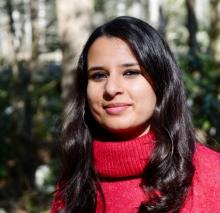A talk by Professor Hafsa Kanjwal (Assistant Professor of History at Lafayette College), on Colonizing Kashmir: State-building Under Indian Occupation, her new book which interrogates how Kashmir was made “integral” to India through a study of the decade long rule (1953-1963) of Bakshi Ghulam Mohammad, the second Prime Minister of the State of Jammu and Kashmir.
Event moderated by Aarti Sethi, Assistant Professor of Anthropology, UC Berkeley.
_________________
This event will be live streamed on the Institute’s FB page: ISASatUCBerkeley
_________________
About the Book
 The Indian government, touted as the world’s largest democracy, often repeats that Jammu and Kashmir—its only Muslim-majority state—is “an integral part of India.” The region, which is disputed between India and Pakistan, and is considered the world’s most militarized zone, has been occupied by India for over seventy-five years. In this book, Hafsa Kanjwal interrogates how Kashmir was made “integral” to India through a study of the decade long rule (1953-1963) of Bakshi Ghulam Mohammad, the second Prime Minister of the State of Jammu and Kashmir.
The Indian government, touted as the world’s largest democracy, often repeats that Jammu and Kashmir—its only Muslim-majority state—is “an integral part of India.” The region, which is disputed between India and Pakistan, and is considered the world’s most militarized zone, has been occupied by India for over seventy-five years. In this book, Hafsa Kanjwal interrogates how Kashmir was made “integral” to India through a study of the decade long rule (1953-1963) of Bakshi Ghulam Mohammad, the second Prime Minister of the State of Jammu and Kashmir.
Drawing upon a wide array of bureaucratic documents, propaganda materials, memoirs, literary sources, and oral interviews in English, Urdu, and Kashmiri, Kanjwal examines the intentions, tensions, and unintended consequences of Bakshi’s state-building policies in the context of India’s colonial occupation. She reveals how the Kashmir government tailored its policies to integrate Kashmir’s Muslims while also showing how these policies were marked by inter-religious tension, corruption, and political repression.
Challenging the binaries of colonial and postcolonial, Kanjwal historicizes India’s occupation of Kashmir through processes of emotional integration, development, normalization, and empowerment to highlight the new hierarchies of power and domination that emerged in the aftermath of decolonization. In doing so, she urges us to question triumphalist narratives of India’s state-formation, as well as the sovereignty claims of the modern nation-state.
About the Author
Hafsa Kanjwal is an assistant professor of South Asian History in the Department of History at Lafayette College in Easton, Pennsylvania, where she teaches courses on the history of the modern world, South Asian history, and Islam in the Modern World.
As a historian of modern Kashmir, she is the author of Colonizing Kashmir: State-building Under Indian Occupation (Stanford University Press, 2023), which examines how the Indian and Kashmir governments utilized state-building to entrench India’s colonial occupation of Kashmir in the aftermath of Partition.
Currently, she is working on two book projects. The first is a general history of modern Kashmir. The second examines questions of Muslim political sovereignty and the secular, liberal international order in the context of 20th and 21st century Kashmir.
Hafsa has written and spoken on her research for a variety of news outlets including The Washington Post, Al Jazeera English, and the BBC.
_________________
Follow us on TWITTER
Like us on FACEBOOK
For DIRECTIONS to the Institute please enter “Institute for South Asia Studies” in your google maps or click this GOOGLE MAPS LINK.
PARKING INFORMATION
Please note that parking is not always easily available in Berkeley. Take public transportation if possible or arrive early to secure your spot.
Event is FREE and OPEN to the public.
_____________
If you require an accommodation for effective communication (ASL interpreting/CART captioning, alternative media formats, etc.) or information about campus mobility access features in order to fully participate in this event, please contact Puneeta Kala at pkala@berkeley.edu with as much advance notice as possible and at least 7-10 days in advance of the event.

